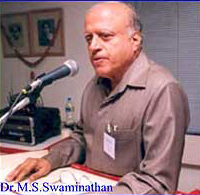Know Our World Famous Indian Agricultural Scientist The Father Of Green Revolution in India

����And our own Indian Agricultural Scientists have to say ,to quote a few Prof.M S Swaminathan has been acclaimed by TIME magazine as one of the twenty most influential Asians of the 20th century and one of the only three from India, the other two being Mahatma Gandhi and Rabindranath Tagore. He has been described by the United Nations Environment Programme as "the Father of Economic Ecology" and by Javier Perez de Cuellar, Secretary General of the United Nations, as "a living legend who will go into the annals of history as a world scientist of rare distinction". He was Chairman of the UN Science Advisory Committee set up in 1980 to take follow-up action on the Vienna Plan of Action. He has also served as Independent Chairman of the FAO Council and President of the International Union for the Conservation of Nature and Natural Resources.
A plant geneticist by training, Prof. Swaminathan's contributions to the agricultural renaissance of India have led to his being widely referred to as the scientific leader of the green revolution movement. His advocacy of sustainable agriculture leading to an evergreen revolution makes him an acknowledged world leader in the field of sustainable food security.
The International Association of Women and Development conferred on him the first international award for significant contributions to promoting the knowledge, skill, and technological empowerment of women in agriculture and for his pioneering role in mainstreaming gender considerations in agriculture and rural development. Prof. Swaminathan was awarded the Ramon Magsaysay Award for Community Leadership in 1971, the Albert Einstein World Science Award in 1986, the first World Food Prize in 1987, Volvo Environment Prize in 1999, and the Franklin D Roosevelt Four Freedoms Award in 2000.Prof. Swaminathan is a Fellow of many of the leading scientific academies of India and the world, including the Royal Society of London and the US National Academy of Sciences. He has received 43 honorary doctorate degrees from universities around the world. Recently, he has been elected as the President of Pugwash Conferences on Science and World Affairs. He currently holds the UNESCO Chair in Ecotechnology at the M S Swaminathan Research Foundation in Chennai (Madras), India.
Some Important Presentations given by Prof. M. S. Swaminathan
- UNICEF's Regional Management Team Meeting, New Delhi, November 14, 2003, Development Challenges in South Asia: Implications for Children and women
- Information and Communication Technologies for Poverty Reduction : When, Where and How?, Harvard Faculty Club, Boston 19 September, 2003
- Dorothy Hodgkin Memorial Lecture, Science and Achieving the Goal of a Hunger-free World, La Jolla, USA, 14 August 2002
- Fighting Hunger : From Known-how to Do-how World Food Summit : Five Years Later in Rome, 11 June 2002
- Technology for, by and with the Poor, Ramon Magsaysay Awardees' Meeting in Jaipur, 2 November, 2001
- International Seminar organised by Jacques Maritain with the technical support of FAO, The Right to Food : A Challenge for Peace and Development in the 21st Century, Rome, September 17, 2001
- Brown, Lester R., Seeds of Change: The Green Revolution and Development in the 1970's. New York, Praeger, 1970. Contains a bibliography.
- Freeman, Orville, World without Hunger. New York, Praeger, 1968.
- The Green Revolution: A Symposium on Science and Foreign Policy. Proceedings before the Subcommittee on National Security Policy and Scientific Developments of the Committee on Foreign Affairs, House of Representatives, 91st Congress, First Session, December 5, 1969 (#38-612) J. Washington, D.C., U.S. Government Printing Office, 1970.
- Hardin, Clifford M., ed., Overcoming World Hunger. Englewood Cliffs, N.J., Prentice-Hall, 1969.
- Johnson, David Gale, The Struggle against World Hunger. New York, Foreign Policy Association, 1967.
- Ladejinsky, Wolf, "Ironies of India's Green Revolution", Foreign Affairs, 48 (July, 1970) 758-768.
- 17th International Congress on Nutrition, Nutrition in the Third Millennium : Countries in Transition , Vienna, 27-31 August
- University of Massachusetts, Boston, Commencement Address, June 2, 2001
- Convocation address at The Tamil Nadu Dr M G R Medical University Eleventh Convocation - Chennai, 28 March 2001.
Biswas, B.C and Das, Soumitradas; Role of Fertilizer in Doubling Oilseed Productivity in India.
Fertilizer News, 1999. Vol.44(10) 23-26 p.
Role of fertilizer in improving foodgrains production is well documented. Oilseeds, an energy rich group of crops, are mainly grown in energy starved rainfed conditions. Presently, oilseed crops grown in 26 million hectares in India to produced about 25 million tones of oilseeds removed nearly 3 million tones of major nutrients (NPK) alongwith sizable amount of secondary (S etc.) and micronutrients (Zn, B, Mo etc.). Very little amount of fertilizer nutrient is added in oilseed crops against a colossal removal of 3 million tones per annum. This is a serious soil health hazard, which needs urgent attention of all concerned. The paper deals with the role that fertilizer nutrient can play in doubling the oilseeds productivity in the country.
Some Valuable Agricultural Statistical data of India from the archives say On all India basis, soils are deficient in different micronutrients as follows: 47% ZN, 20% B, 18% Mo, 12% Fe, 4% Mn and 5% Cu. The current requirement of micronutrients in India is 1,10,523 tonnes per year. The demand for micronutrients would further increase to 1,90,227 tonnes in 2025 AD.